Digital payments set to advance further as demonstrated by European fintech debate

Every year, technology companies, digital developers, financial markets regulators and payment processing firms gather in Berlin to exhibit the latest and forthcoming developments in digital payments, engage in the debate relating to which direction electronic payments will take, and how the public and businesses will interact with their customers and suppliers in future.
This event takes place every year in Berlin and is attended by some 2,000 professionals from across the world, as well as executives from financial markets regulators, and the key focus is the ecosystem which supports and provides merchant payments – those being payments made by individuals when buying items from shops or online.
What is different this year?
Why is a recurring conference in which technologists and regulators discuss the way forward for electronic payments interesting?
It would be fair to assume that the level of conversation would be very industry-specific and therefore not of great interest to people who just want to go about daily life, using easy-to-use methods of making payments such as contactless cards, a smartphone with an e-wallet containing debit or credit card details, or a smartwatch.
Whilst that level of sophistication has been brought to fruition by exactly the same people who attend this and many other payment industry conferences, this year, there was a different angle, which very much should be of interest to everyone.
There was a large amount of discussion relating to what is known as CDBCs, which is an acronym that stands for Central Bank Digital Currencies.
These are normal ‘fiat’ currencies, meaning they would be the Euro, British Pound, US Dollar and other sovereign currencies, but instead of being manufactured from paper or metal and circulated in the form of cash, they would be issued electronically and therefore would have the same value and purpose as the paper notes and metal coins, but would have no physical shape at all.
Why is this interesting?
So what? You may think. As long as these new digital forms of existing currencies have the same value and operate in the same form as cash, they will be of no consequence to everyday life.
The reality is that the introduction of CDBCs would be an important milestone in the way in which people all over the world use their local currency to buy everyday items.
Firstly, the technology and security behind payment systems and cards issued by banks and fintech firms would have to be absolutely paramount for issuers of such cards because the introduction of CDBCs signals the beginning of the end for physical cash, therefore there are potentially likely to be fewer options for using cash when buying items from stores.
This means that many people will need to use an electronic form of payment, be that a contactless debit card or e-wallet held on a smartphone and not only will have to familiarise themselves with how to use such an item but will also expect high levels of security from the provider.
It is therefore worth checking for important technological attention to this by your card provider and ensuring that your card and digital mobile application have features such as ‘two-factor authentication’, often referred to as 2FA, which means that in order to access your account and activate or view card details including the debit card number and PIN, you would have to go through two ‘login’ phases rather than one, such as facial recognition and then to answer a unique question.
Of course, with the reduction of the use of cash, traditional security issues such as having a wallet picked from your pocket containing cash are becoming a thing of the past, and instead of simple opportunist crime such as pickpocketing, those wishing to steal money are now resorting to advanced tactics such as hacking into debit or credit card accounts and obtaining authentication details.
Overall, security is one important matter, but so are service and accessibility.
What are the concerns?
During the course of last week’s conference, fintech innovators and regulatory officials debated whether the introduction of CDBCs is laudable or lamentable, with the central bankers toeing the cautious line when questioned about privacy and the perceived lessening of personal freedom if the government has control over access to currencies due to them being digital rather than physical and issued by central banks.
On both sides of the discussion, it was clear that CDBCs are very much on the way, and parts of the world with developed financial markets economies, such as the United Kingdom, mainland Europe and North America, are working full steam ahead to bring them into circulation.
Indeed, the United Kingdom is one of the staunchest advocates of bringing in CDBCs.
Therefore, it is important to be prepared and ensure that your e-wallet and digital card provider is able to provide the most user-friendly and secure service when interacting electronically with your funds as the world moves toward a more cashless society.
Monevium is the Trading Name of Advanced Wallet Solutions Limited, a company registered in the UK under company number 10251711 and is regulated by the UK’s Financial Conduct Authority under Firm Reference Number 766038.
Open Monevium Account in Minutes
The future of money management is only a few clicks away. Apply here to have complete control over your money.


